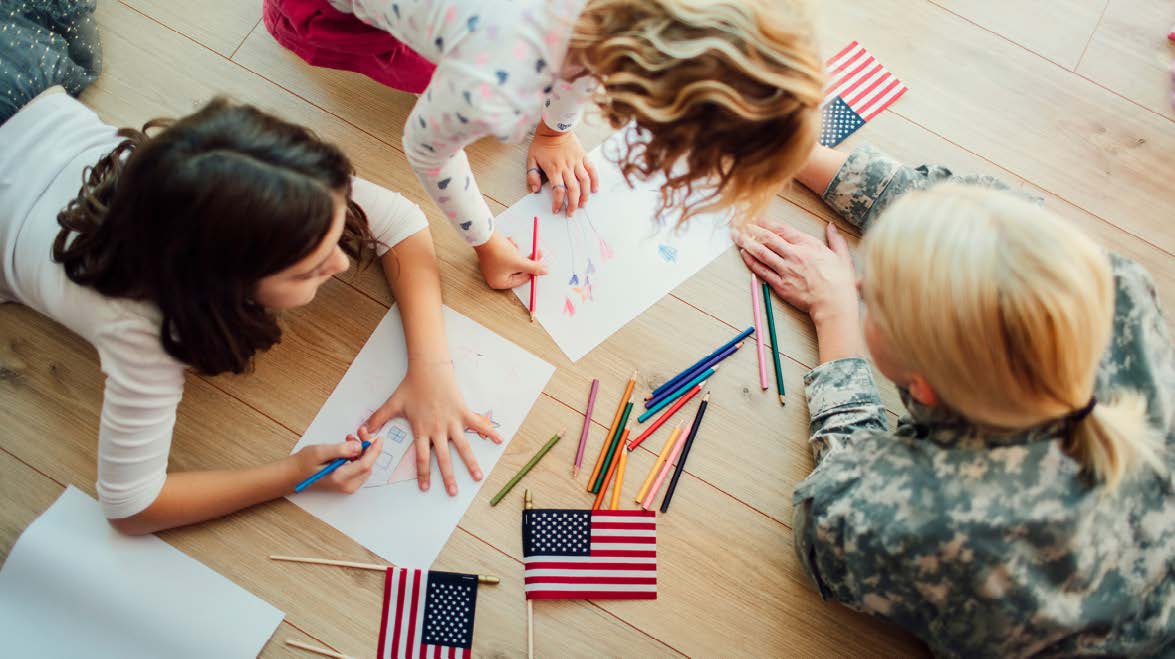
BUILDING RESILIENCY THROUGH A COLLABORATIVE IEP PROCESS IN SUPPORT OF MILITARY FAMILIES
BY ANGELA SHAW
One of the most precious and durable commodities that parents can nurture within their children is the quality of resiliency. Resilience – the bounce-back quality that supports an individual in adapting to and recovering from setbacks and overcoming snags in life – allows one to power through unexpected or long-term difficulties, while becoming better equipped to manage future hurdles.
In times of adversity or crisis, an individual's inner-strength and coping skills are often called upon to manage and minimize stressors in a reactive manner. Coping skills, such as taking a walk when angry, counting backwards from 5 before responding, or using an "I feel" statement, are some strategic actions that individuals can use to deal with stress. Resiliency provides for an outlook that comes from within. Building and reframing mindsets in support of the agile qualities of a resilient kid begins with demonstrating productive coping skills. The proactive viewpoint of a resilient family member, colleague, or future leader, has the capacity to adjust a course toward success and well-being across a lifetime, through their model of positivity and creativity.
Practicing self-care through healthy life choices, self-analysis through discussion of lessons learned from slip-ups, and self-acceptance through pub licly and privately accepting our own mixed bag of wins and losses, all help guide the children towards the natural choice of wise and healthful habits, encourages development of a balanced expectation and reaction to life— and creates a positive internalization process in support of motivation, planning, and positivity. These everyday examples, combined with direct teaching of customized coping skills, bolster the development of an internal toolbox of strategies.
In providing supports toward learning and effectively navigating life through proactive coping skills, a springboard is created toward inspiring and nurturing your child's resiliency. A resilient mindset can lead to improved learning and academic achievement, and decreased absences from school or, eventually, the workplace. Additionally, the ability to speedily and efficiently recover and adapt to challenges provides for an increased capacity to bounce back stronger and wiser from life's adversities.
Military service members, by the very nature of their chosen path of helping protect and serve the country, are accustomed to navigating the challenges included in their mobile life of lengthy and recurring deployments and transfers across the map. This highly mobile lifestyle allows their children to experience a unique perspective in life, due to frequent moves, a product of military assignments termed a permanent change of station (PCS). Their perpetual movement provides a lifestyle that goes beyond traditional classrooms and hometown neighborhoods, affording them a viewpoint into an assortment of regional, social and academic settings they would otherwise have missed out on.
THE MILITARY CHILD WITH SPECIAL NEEDS
When a military child experiences educational or physical differences, the everchanging realities of military life take on increased challenges that require specialized supports and resources beyond that of their civilian counterparts. Military installments provide a robust range of services in support of families on the move, including military service members and their families caring for members with special needs. Additionally, federal educational legislation, currently known as Individuals with Disabilities Education Act (IDEA), is law in support of all eligible children with disabilities throughout the nation and ensures special education and related services through an Individualized Education Program (IEP).
When considering the school-based support of the IEP, a synergetic approach toward nurturing qualities that encourage the development of resiliency are foundational to a customized IEP within a well-informed and proactive IEP team. Through the broad strokes of the IEP process, the team has the ability to link home and school-based forces that provide appropriate supports and individualized goals within the least restrictive environment (LRE), based upon a child's individualized profile of strengths, needs and present levels. Parent perspectives are essential to the team discussion, particularly when a student is highly mobile or new to a school. In addition to military resources that support smooth and equitable transitions for students with special needs, parents provide an important context by providing to the school-based team insight of their child's motivations, needs, and often shifting experiences. Such features included within the IEP document that is presented at the IEP meeting include:
STRENGTHS AND CONCERNS
When determining a student's needs, an essential component to the IEP is to discover and share the student's areas of strength, in order to provide focused understanding that holds promise of continued growth and positive development. Observance and input from current educators and related service personnel, as well as school records, offer academic, social and emotional information based upon categorical points of reference relative to expectations of grade level, or of age, to include possible concerns. A broader point of view from parents and, as appropriate, the student, adds a measure of comprehensive insight to the areas of competence that can be built upon for greater opportunities of lifelong educational and social/emotional growth and success. Parents are able to share pivotal points of their child's learning experience, as well as engagement insights as to what motivates and fascinates them. Hobbies, special interests, and past successes open up several avenues for general izing learning in the classroom and on the playground, as well as across a multitude of extra-curricular opportunities that help build a stronger sense of belonging. Parents and educators communicating in a proactive manner results in greater understanding and presents children with a real-life positive model of thoughtful and beneficial collaboration.
APPLICATIONS FOR THE HOME FRONT:
• Highlight, cultivate and generalize your child's strengths as a launchpad toward proactive problem-solving and a pathway toward self-discovery. Support their strengths through hobbies and special interests to build passion and confidence. For example, talking about past challenges or hurdles that were successfully navigated when learning a new yoga flow, constructing a kite, or discovering a new star through their telescope may provide opportunities for nurturing a proactive mindset.
• Praising your child's success to include time spent in practice and problem-solving strategies encourages them to embrace their accomplishments while bringing preparation and planning to the forefront. Goal setting, stamina and perseverance are primed when kids are involved through their personal experiences.
• Finding a way to share your mistakes and problem-solving strategies, appropriate to your child's age and development, helps them understand that they are not alone. For example, sharing that you forgot to buy paper towels at the store that day and offering a simple solution of supplying the family a hand towel on the kitchen counter for hand drying (until you can get to a store again) helps your child learn about problem-solving.
PRESENT LEVELS OF PERFORMANCE (PLOP)
Current academic, behavioral and social emotional experiences and levels, are shared at the IEP meeting to provide a comparison of successful areas while sifting through other areas in need of strengthening and building. This has potential to build a goal through utilizing the process of task analysis and breaking down a skill or task to its smallest steps, to plan a path of learning.
APPLICATIONS FOR THE HOME FRONT:
• Break down chores, family cooking, or other activities into steps at the present level of access, using visual schedules or checklists to support and grow planning. Ensuring your child's access by starting at your child's present level is a way to provide a scaffold to work through challenges, and build a repertoire of strategies to draw upon in the future.
• Play! Sharing silly kid jokes, enjoying family game nights, or engaging in a fun-filled game of hopscotch or basketball in the driveway, can lead to a wealth of self-awareness and discoveries. The outgrowth of increasing knowledge, physical and mental dexterity and strength, and coping skills through positive play, has the potential to encourage the growth of a personal toolbox of self-assurance that generalizes beyond home and school.
• Stretch your child's reading and language development beyond current levels by reading together. Reading high-interest materials together nurtures creativity and sparks exploration of new ideas and perspective-taking. Enjoying lively discussions about ideas, consequences or joys explored together further connects creativity, wonder and even empathy.
SUPPLEMENTARY AIDS AND SERVICES
Accommodations, modifications and supports are individualized and documented within the IEP document, as appropriate, based upon each student's unique profile, in order to provide access to learning within their educational setting. This includes direct services and supports to the child, as well as appropriate support and training for staff members.
APPLICATIONS FOR THE HOME FRONT:
Scaffolds leading to accomplishment are an ever-present reality across the landscape of home, school and job. Providing opportunities for kids to practice a skill at home until they have it mastered, supports learning and generalization of skills within their community, in the classroom, at play, or work. Children learn to internalize fruitful strategies and prune away less productive ones.
• Include everyone in the joy and bonding of family game night. Modify, adjust and support your child's game participation. Get creative. Consider generalizing some of the supports or modifications listed within the "Supplementary Aids and Services" section of the IEP. Playing classic board games, card games or guessing games are great ways to unplug and connect, while building self-esteem, teamwork, communication, self-discovery, problem-solving, and coping skills.
• Make a plan, a checklist or a visual map to support your child's homebased endeavors. Promoting a broadened collaborative spirit to encourage and support proactive problem-solving approaches–through pitching in at home and discussing other methods or strategies that can be used to complete a project or activity–helps
• Get crafty. Teaching children to follow instructions and persevere, or improving their fine motor skills, are natural outcomes of crafting. Quality time and creation of lasting memories fill emotional reservoirs and connectedness. Confidence is boosted as kids see their progress, experiment with their growing talent, or express themselves with originality. Provision of scaffolds offers students practice in using their classroom accommodations and supports self-advocacy.
• Create a board game together. Movies, a favorite book, or a local landmark can spark imaginations beyond expectation, as you explore and discuss possible themes with children.
• Set up an assembly line where each family member does a part of the craft. Learning and practicing the art of teambuilding and communication is a positive outgrowth that will serve your child across many settings.
• Create a family tradition. Make greeting cards for family and friends. Communication skills, perspective taking and caring are bolstered, as children design their messages.
A highly effective mode of reaching and teaching children is accomplished within an authentic environment, such as home and community. Weaving together these three IEP segments within the home, provides focus and generalization across settings, and an entry point toward realizing a strong foundation of resiliency. Such focus provides a starting point and a journey that's customized to meet each family's specific situation.
In addition to the IEP process, transition-related challenges facing each PCS, deployment or post-deployment, can be further met head-on in support of each military family's unique circumstance, through the robust range of resources provided within the military installations. Applying strategies towards achieving an IEP goal provides a roadmap that can be generalized at home and inspire the development of a resilient child to navigate and grow from tough situations throughout their lives.
ABOUT THE AUTHOR:

Angela Shaw is a retired special educator. Her publishing focus is upon special education topics. She synthesizes her diverse teaching experiences and education to support and encourage families as they navigate the special needs of their children across a changing educational landscape. Angela's son-in-law is active-duty military. She and her husband spend as much time as possible adventuring to various PCS locations to enjoy time and be a part of their military family's life.